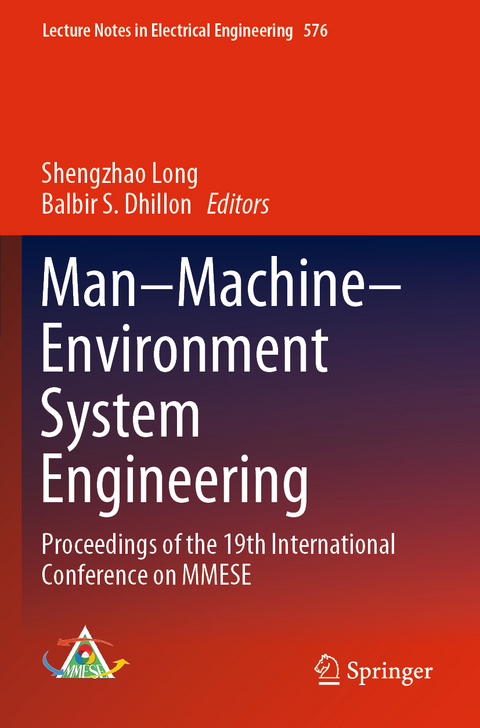
Man–Machine–Environment System Engineering
Springer Verlag, Singapore
978-981-13-8781-4 (ISBN)
These proceedings showcase the best papers selected from more than 500 submissions, and introduce readers to the latest research topics and developmental trends in the theory and application of MMESE. The integrated research topic Man–Machine–Environment System Engineering (MMESE) was first established in China by Professor Shengzhao Long in 1981, with direct support from one of the greatest modern Chinese scientists, Xuesen Qian. In a letter to Long from October 22nd, 1993, Qian wrote: “You have created a very important modern science and technology in China!”
MMESE studies the optimum combination of man–machine–environment systems. In this system, “man” refers to the people in the workplace (e.g. operators, decision-makers); “machine” is the general name for any object controlled by man (including tools, machinery, computers, systems and technologies), and “environment” describes the specific working conditions under which man and machine interact (e.g. temperature, noise, vibration, hazardous gases, etc.). The three main goals of optimizing man–machine–environment systems are to ensure safety, efficiency and economy.
These proceedings present interdisciplinary studies on concepts and methods from physiology, psychology, system engineering, computer science, environmental science, management, education, and other related disciplines. They offer a valuable resource for all researchers and professionals whose work involves interdisciplinary areas touching on MMESE subjects.
Professor Shengzhao Long is the founder of the Man–Machine–Environment System Engineering (MMESE), the Chairman of the Man–Machine–Environment System Engineering (MMESE) Committee of China, the Chairman of the Beijing KeCui Academy of Man–Machine–Environment System Engineering (MMESE) and the Former Director of Ergonomics Lab of Astronaut Center of China. In October 1992, he was honored by the National Government Specific Allowance. Professor Shengzhao Long graduated from the Shanghai Science and Technology University in 1965, China. In 1981, supported by the famous modern scientist Xuesen Qian, he founded MMESE theory. In 1982, he proposed and developed Human Fuzzy Control Model using fuzzy mathematics. From August of 1986 to August of 1987, conducted research in Man–Machine System as a visiting scholar at Tufts University, Massachusetts, U.S.A. In 1993, he established Man–Machine–Environment System Engineering (MMESE) Committee of China. He published “Foundation of theory and application of Man–Machine–Environment System Engineering” (2004) and “Man–Machine–Environment System Engineering” (1987). He was also the editor of the proceedings of “the Conference (1st to the 17th) on Man–Machine–Environment System Engineering” from 1993 to 2018. Dr. Balbir S. Dhillon attended the University of Wales where he received a B.S. in electrical and electronic engineering and an M.S. in mechanical engineering. He received a Ph.D. in industrial engineering from the University of Windsor. He is a professor of Engineering Management in the Department of Mechanical Engineering at the University of Ottawa, Canada. He has served as a Chairman/Director of Mechanical Engineering Department/Engineering Management Program for over 10 years at the same institution. He published over 345 (i.e., 201 journals + 144 conference proceedings) articles on reliability, safety, engineering management, etc. He is or has been on the editorial boards of 9 international scientific journals. In addition, Dr. Dhillon wrote 34 books on various aspects of reliability, design, safety, quality, and engineering management. His books are being used in over 85 countries and many of them are translated into languages such as German, Russian and Chinese. He served as General Chairman of two international conferences on reliability and quality control held in Los Angeles and Paris in 1987.
Research on the Man Character.- Research on the Machine Character.- Research on the Environment Character.- Research on the Man-Machine Relationship.- Research on the Man-Environment Relationship.- Research on the Machine-Environment Relationship.- Research on the Overall Performance of Man-Machine-Environment System.- Theory & Application Research of the Man-Machine-Environment System Engineering.
| Erscheinungsdatum | 18.08.2020 |
|---|---|
| Reihe/Serie | Lecture Notes in Electrical Engineering ; 576 |
| Zusatzinfo | XXII, 920 p. |
| Verlagsort | Singapore |
| Sprache | englisch |
| Maße | 155 x 235 mm |
| Themenwelt | Informatik ► Theorie / Studium ► Künstliche Intelligenz / Robotik |
| Studium ► 1. Studienabschnitt (Vorklinik) ► Physiologie | |
| Technik ► Elektrotechnik / Energietechnik | |
| Technik ► Maschinenbau | |
| Schlagworte | Environment Character • Machine Character • Machine-Environment Relationship • Man Character • Man-Environment Relationship • Man-Machine-Environment System Engineering • Man-Machine Relationship • Overall Performance of Man-Machine-Environment System • System Engineering |
| ISBN-10 | 981-13-8781-8 / 9811387818 |
| ISBN-13 | 978-981-13-8781-4 / 9789811387814 |
| Zustand | Neuware |
| Haben Sie eine Frage zum Produkt? |
aus dem Bereich


